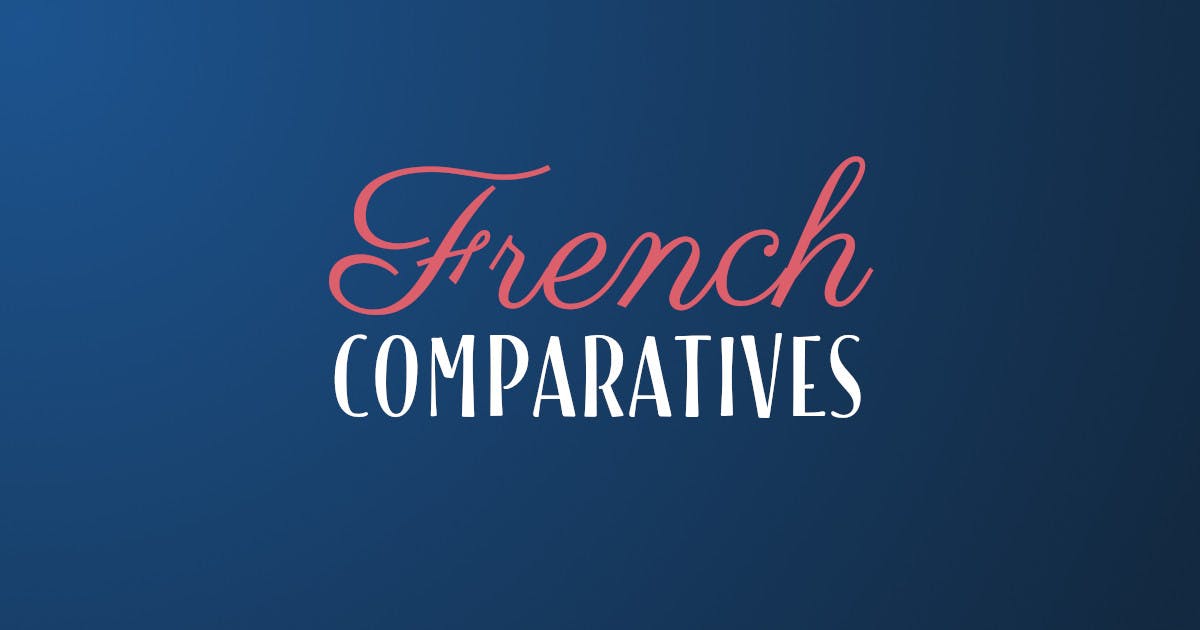How To Form French Comparatives
The Different Degrees of Comparison in French
French and English enjoy common ways of expressing degrees of comparison namely , equality or inequality.
(Inequality can reflect either inferiority [e.g. less than], greatest inferiority [e.g. the least], superiority [e.g. more than] or greatest superiority [e.g. the most] between people or things.) However, French does not have an equivalent to the English ending forms -er and -est (e.g. abler, ablest) to express superiority or greatest superiority.
In both languages, comparisons are made with/about nouns, pronouns, adjectives and adverbs.
Equality, Inferiority and Superiority
Except for the six exceptions detailed below, one always uses “moins” to express inferiority (e.g. moins accentué / less accented) or “plus” to express superiority (e.g. plus capable / more capable).
| French | English | |
|---|---|---|
| Equality | aussi adjective/adverb (que) | as … (as) |
| autant de noun (que noun/pronoun) | as many/much … (as) | |
| autant que noun/pronoun | as many/much … as | |
| Inferiority | moins adjective/adverb (que) | less … (than) |
| moins de noun (que) | less … (than) | |
| moins de numeral | less than … | |
| Superiority | plus adjective/adverb (que) | more … (than) |
| plus de noun (que) | more … (than) | |
| plus de numeral | more than … |
Examples:
Equality:
Il fait aussi chaud que l’an dernier. / The weather is as hot as last year. (adjective)
Elle vient aussi souvent que moi. / She comes as often as I. (adverb)
J’ai autant de chance que toi. / I have as much luck as you. (noun … pronoun)
Elle nous manque autant qu’á toi./ We miss her as much as you. (pronoun)
Inferiority:
Ce terrain est moins développé que l’autre. / This plot is less developed than the other one. (adjective)
On avance moins rapidement que prévu. / We are advancing less rapidly than anticipated. (adverb)
Vous attrapez moins de poissons que votre voisin. / You catch fewer fish than your neighbor. (noun)
Brad Pitt est payé moins de cent millions de dollars. / Brad Pitt is paid less than one hundred million dollars. (numeral)
Superiority:
C’est plus beau que je ne le croyais. / It’s more beautiful than I thought. (adjective)
Ils ont répondu plus gentiment que vous. / They answered more nicely than you. (adverb)
Nous avons plus de courage que nos adversaires. / We have more courage than our opponents. (noun)
Tu as perdu plus de dix mille euros. / You lost more than ten thousand euros. (numeral)
There are 3 adjectives and 3 adverbs whose comparison progressions are irregular.
*Irregular Adjective Superiority Comparison:
bon => good
meilleur (NOT plus bon) => better (comparative)
mauvais => bad
plus mauvais (pire) => worse (comparative)
petit => small
plus petit (moindre) => smaller (comparative)
- bon is the only true exception as it has no regular comparative; the other two have irregular comparatives as well as regular ones, with the irregular forms (in parenthesis) being used in more circumscribed situations.
Irregular Adverb Superiority Comparison:
bien => well
mieux (NOT plus bien) => better (comparative)
peu => little (comparative)
moins (NOT plus peu) => less
beaucoup => very, much
plus (NOT plus beaucoup) => more (comparative)

SUBSCRIBE: